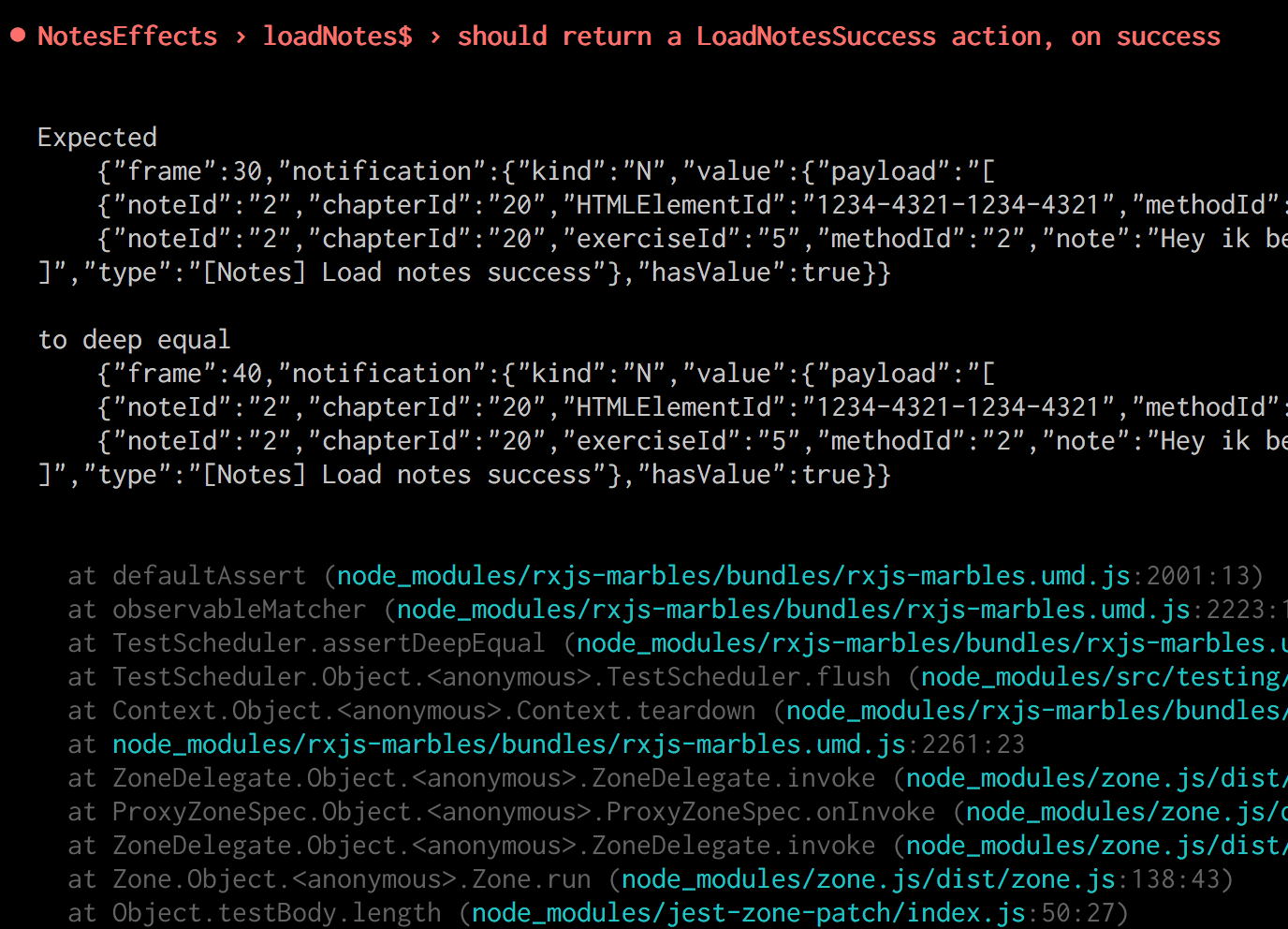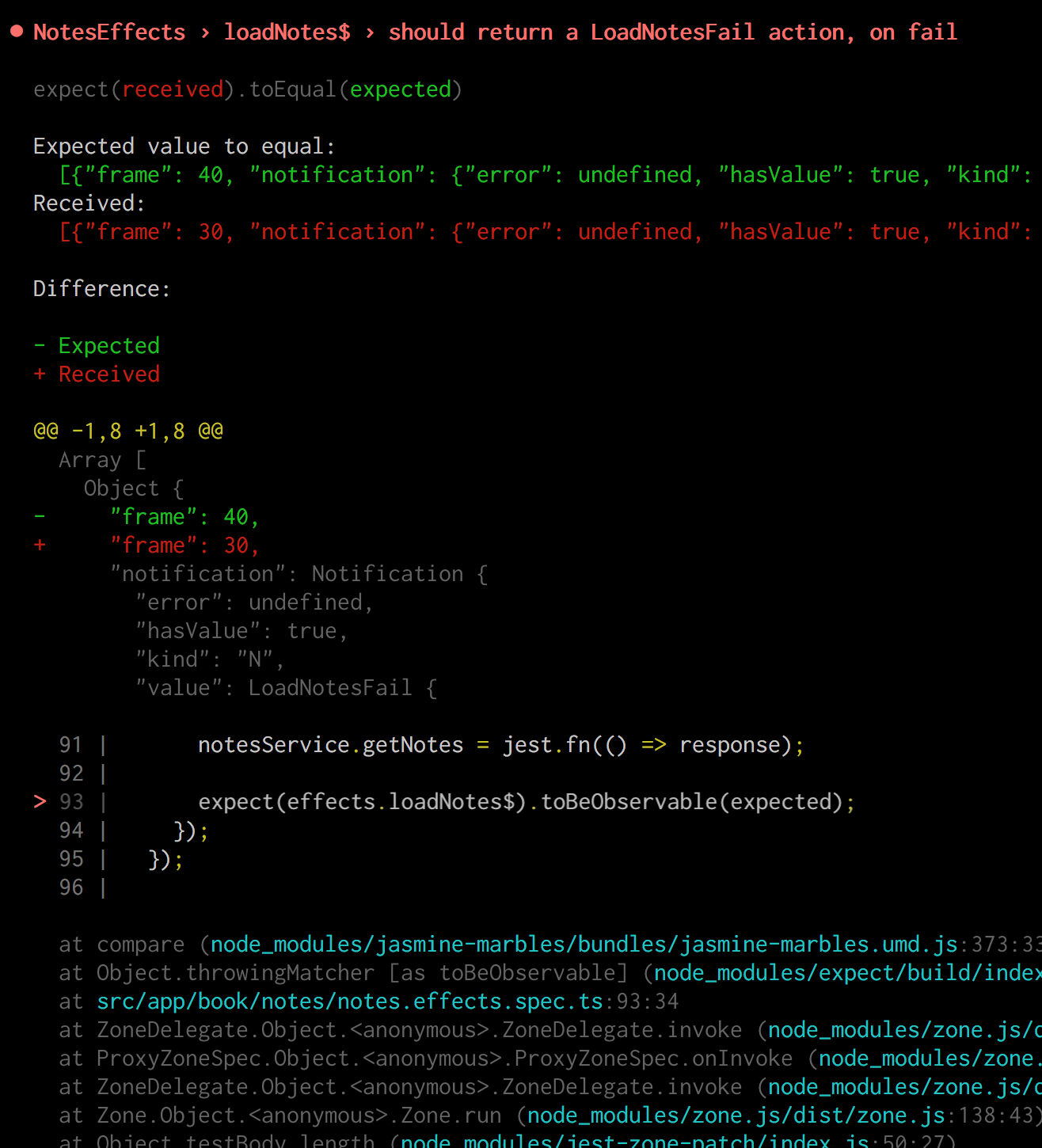rxjs-marbles is an RxJS marble testing library that should be compatible with any test framework. It wraps the RxJS TestScheduler and provides methods similar to the helper methods used the TestScheduler API.
It can be used with AVA, Jasmine, Jest, Mocha or Tape in the browser or in Node and it supports CommonJS and ES module bundlers.
I created this package because I wanted to use RxJS marble tests in a number of projects and those projects used different test frameworks.
There are a number of marble testing packages available - including the Mocha-based implementation in RxJS itself - but I wanted something that was simple, didn't involve messing with globals and beforeEach/afterEach functions and was consistent across test frameworks.
If you are looking for something similar, this might suit.
Install the package using NPM:
npm install rxjs-marbles --save-dev
If you're just getting started with marble testing, you might be interested in how I wasted some of my time by not carefully reading the manual: RxJS Marble Testing: RTFM.
In particular, you should read the RxJS documentation on marble syntax and synchronous assertion.
rxjs-marbles contains framework-specific import locations. If there is a location for the test framework that you are using, you should use the specific import. Doing so will ensure that you receive the best possible integration with your test framework.
For example, importing from "rxjs-marbles/jest" will ensure that Jest's matcher is used and the output for test failures will be much prettier.
Instead of passing your test function directly to it, pass it to the library's marbles function, like this:
import { marbles } from "rxjs-marbles/mocha";
import { map } from "rxjs/operators";
describe("rxjs-marbles", () => {
it("should support marble tests", marbles(m => {
const source = m.hot("--^-a-b-c-|");
const subs = "^-------!";
const expected = "--b-c-d-|";
const destination = source.pipe(
map(value => String.fromCharCode(value.charCodeAt(0) + 1))
);
m.expect(destination).toBeObservable(expected);
m.expect(source).toHaveSubscriptions(subs);
}));
});To see how rxjs-marbles can be used with other test frameworks, see the examples within the repository.
With AVA and Tape, the callback passed to the marbles function will receive an addional argument - the AVA ExecutionContext or the Tape Test - which can be used to specify the number of assertions in the test plan. See the framework-specific examples for details.
In addition to the marbles function, the library exports a cases function that can be used to reduce test boilerplate by specifying multiple cases for variations of a single test. The API is based on that of jest-in-case, but also includes the marbles context.
The cases implementation is framework-specific, so the import must specify the framework. For example, with Mocha, you would import cases and use it instead of the it function, like this:
import { cases } from "rxjs-marbles/mocha";
import { map } from "rxjs/operators";
describe("rxjs-marbles", () => {
cases("should support cases", (m, c) => {
const source = m.hot(c.s);
const destination = source.pipe(
map(value => String.fromCharCode(value.charCodeAt(0) + 1))
);
m.expect(destination).toBeObservable(c.e);
}, {
"non-empty": {
s: "-a-b-c-|",
e: "-b-c-d-|"
},
"empty": {
s: "-|",
e: "-|"
}
});
});In RxJS version 6, a run method was added to the TestScheduler and when it's used, the scheduler's behaviour is significantly changed.
rxjs-marbles now defaults to using the scheduler's run method. To use the scheduler's old behaviour, you can call the configure function, passing { run: false }, like this:
import { configure } from "rxjs-marbles/mocha";
const { cases, marbles } = configure({ run: false });WARNING: bind is deprecated and can only be used with configure({ run: false }).
Sometimes, passing the TestScheduler instance to the code under test can be tedious. The context includes a bind method that can be used to bind a scheduler's now and schedule methods to those of the context's TestScheduler.
bind can be passed specific scheduler instances or can be called with no arguments to bind RxJS's animationFrame, asap, async and queue schedulers to the context's TestScheduler.
For example:
it("should support binding non-test schedulers", marbles(m => {
m.bind();
const source = m.hot("--^-a-b-c-|");
const subs = "^--------!";
const expected = "---a-b-c-|";
// Note that delay is not passed a scheduler:
const destination = source.delay(m.time("-|"));
m.expect(destination).toBeObservable(expected);
m.expect(source).toHaveSubscriptions(subs);
}));WARNING: reframe is deprecated and can only be used with configure({ run: false }).
The RxJS TestScheduler defaults to 10 virtual milliseconds per frame (each character in the diagram represents a frame) with a maximum of 750 virtual milliseconds for each test.
If the default is not suitable for your test, you can change it by calling the context's reframe method, specifying the time per frame and the (optional) maximum time. The reframe method must be called before any of the cold, flush, hot or time methods are called.
The examples include tests that use reframe.
If the BDD syntax is something you really don't like, there are some alternative methods on the Context that are more terse:
const source = m.hot("--^-a-b-c-|", values);
const subs = "^-------!";
const expected = m.cold("--b-c-d-|", values);
const destination = source.map((value) => value + 1);
m.equal(destination, expected);
m.has(source, subs);The rxjs-marbles API includes the following functions:
interface Configuration {
assert?: (value: any, message: string) => void;
assertDeepEqual?: (a: any, b: any) => void;
frameworkMatcher?: boolean;
run?: boolean;
}
function configure(options: Configuration): { marbles: MarblesFunction };The configure method can be used to specify the assertion functions that are to be used. Calling it is optional; it's only necessary if particular assertion functions are to be used. It returns an object containing a marbles function that will use the specified configuration.
The default implementations simply perform the assertion and throw an error for failed assertions.
function marbles(test: (context: Context) => any): () => any;
function marbles<T>(test: (context: Context, t: T) => any): (t: T) => any;marbles is passed the test function, which it wraps, passing the wrapper to the test framework. When the test function is called, it is passed the Context - which contains methods that correspond to the TestScheduler helper methods:
interface Context {
autoFlush: boolean;
bind(...schedulers: IScheduler[]): void;
cold<T = any>(marbles: string, values?: any, error?: any): ColdObservable<T>;
configure(options: Configuration): void;
equal<T = any>(actual: Observable<T>, expected: Observable<T>): void;
equal<T = any>(actual: Observable<T>, expected: string, values?: { [key: string]: T }, error?: any): void;
equal<T = any>(actual: Observable<T>, subscription: string, expected: Observable<T>): void;
equal<T = any>(actual: Observable<T>, subscription: string, expected: string, values?: { [key: string]: T }, error?: any): void;
expect<T = any>(actual: Observable<T>, subscription?: string): Expect<T>;
flush(): void;
has<T = any>(actual: Observable<T>, expected: string | string[]): void;
hot<T = any>(marbles: string, values?: any, error?: any): HotObservable<T>;
reframe(timePerFrame: number, maxTime?: number): void;
readonly scheduler: TestScheduler;
teardown(): void;
time(marbles: string): number;
}
interface Expect<T> {
toBeObservable(expected: ColdObservable<T> | HotObservable<T>): void;
toBeObservable(expected: string, values?: { [key: string]: T }, error?: any): void;
toHaveSubscriptions(expected: string | string[]): void;
}In Jasmine, Jest and Mocha, the test framework recognises asynchronous tests by their taking a done callback or returning a promise.
The observe helper can be useful when an observable cannot be tested using a marble test. Instead, expectations can be added to the observable stream and the observable can be returned from the test.
See the examples for usage.
With Jest and Jasmine, the test framework can be configured to use its own concept of fake time. AVA, Mocha and Tape don't have built-in support for fake time, but the functionality can be added via sinon.useFakeTimers().
In some situations, testing asynchronous observables with marble tests can be awkward. Where testing with marble tests is too difficult, it's possible to test observables using the test framework's concept of fake time, but the now method of the AsyncScheduler has to be patched. The fakeSchedulers helper can be used to do this.
See the examples for usage.
Also, I've written an article on the fakeSchedulers function: RxJS: Testing with Fake Time.









